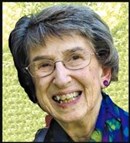Paying My Respects: Connie Wentzel
 Connie Wentzel died in the weeks before Christmas. We attended her Memorial Service yesterday at Plymouth Church in Seattle.
Connie Wentzel died in the weeks before Christmas. We attended her Memorial Service yesterday at Plymouth Church in Seattle.
I had worked with Connie for five years, 1991 – 1996, when she was the Church Business Administrator and I was Senior Minister. She came to Seattle to be near children and grandchildren, leaving a position at Yale Divinity School. After her stint as CBA, Connie continued as a member of Plymouth.
The tributes to Connie were many and thoughtful. One word I didn’t hear used to describe her was “elegant.” But she was elegant, at least I thought so. She possessed a certain stylish grace, not only or even primarily in how she dressed, but in her temperament and the way she handled herself.
My early years at Plymouth were not easy ones. As a pastor you never quite know what you’re getting yourself into with a new congregation. Like people falling in love, both parties have a tendency to see in the other what they want to see. And so it is with congregations, which are always more complex and vexed than you want to imagine.
Not infrequently Connie would come into my office (our offices were next door to one another) in order to check-in. She would listen to my various puzzlements and frustrations and then say, with a French pronunciation, “Courage,” which sounds like “cur’age.” Elegant.
It was a good word and an apt one. No long drawn out analyses. No attempts to fix or advise. Just “Courage.” As if to say, “Buck up, buster, and get on with it.” Occasionally, I would find it irritating. As in, “easy for you to say,” (though it wasn’t — she’d been through some hard things in her life). But generally I considered it a vote of confidence. As in “you can do it.”
This morning at worship at Spirit of Peace UCC where we go, an older member of the congregation asked for the mic during prayer time. As liturgist today, I was handling the high liturgical task of passing the mic. He spoke of a friend who had passed away recently, asking that “Bud” be held in our prayers. He added that when he was younger he remembered hearing that being old meant a steady flow of grief, as you were always losing people. He said, not in a maudlin way, “Now I am old, and it’s true.” It was a simple statement, but heartfelt, and I was moved by it.
Connie’s service ended with a reading from John Bunyan’s Pilgrims Progress. The last and parting words of “Mr. Valiant for Truth” (I suspect they are among the many things Connie was called upon to memorize as a school child). The final sentences are as follows:
“Then said he, I am going to my Father’s; and though with great difficulty I have got hither, yet now I do not repent me of all the trouble I have been at to arrive where I am. My sword I give to him that shall succeed me in my pilgrimage, and my courage and skill to him that can get it. My marks and scars I carry with me, to be a witness for me that I have fought His battles who will now be my rewarder.
“When the day that he must go hence was come, many accompanied him to the river-side, into which as he went, he said, “Death, where is thy sting?” And as he went down deeper, he said, “Grave, where is thy victory?” [1 Cor. 15:55.] So he passed over, and all the trumpets sounded for him on the other side.”
It was as if Connie had once more said, this time to us all, “Courage.”
![Anthony B. Robinson [logo]](https://www.anthonybrobinson.com/wp-content/themes/anthonybrobinson/images/logo.png)
![Anthony B. Robinson [logo]](https://www.anthonybrobinson.com/wp-content/themes/anthonybrobinson/images/logo-print.png)